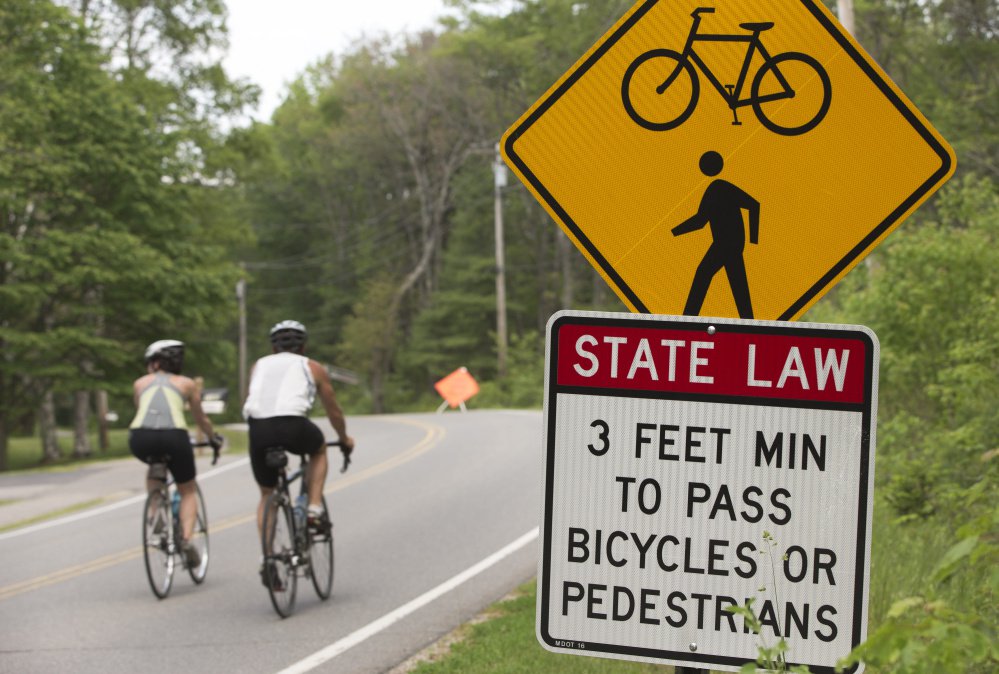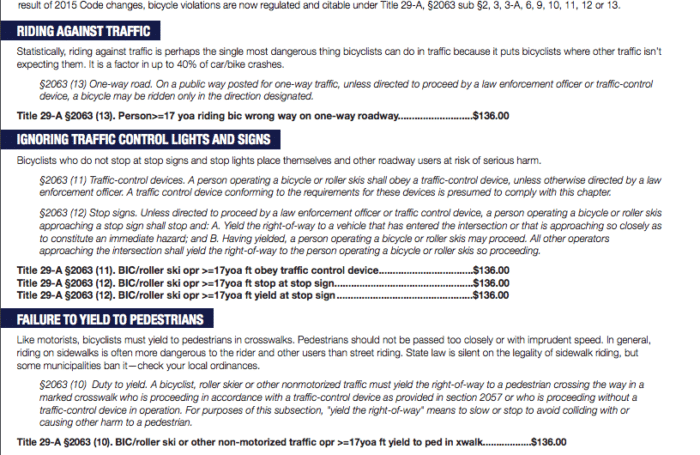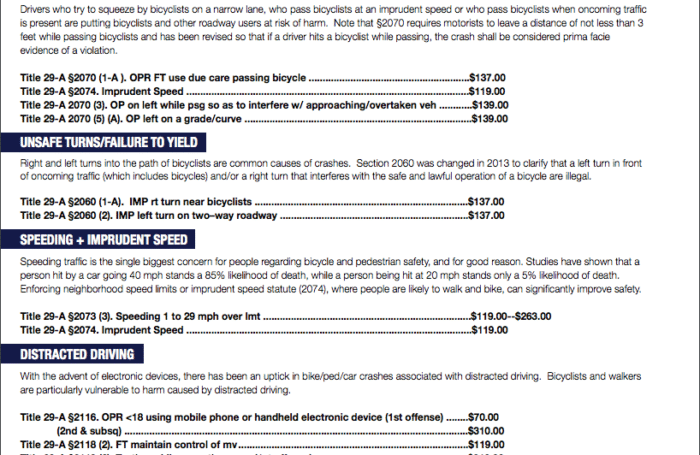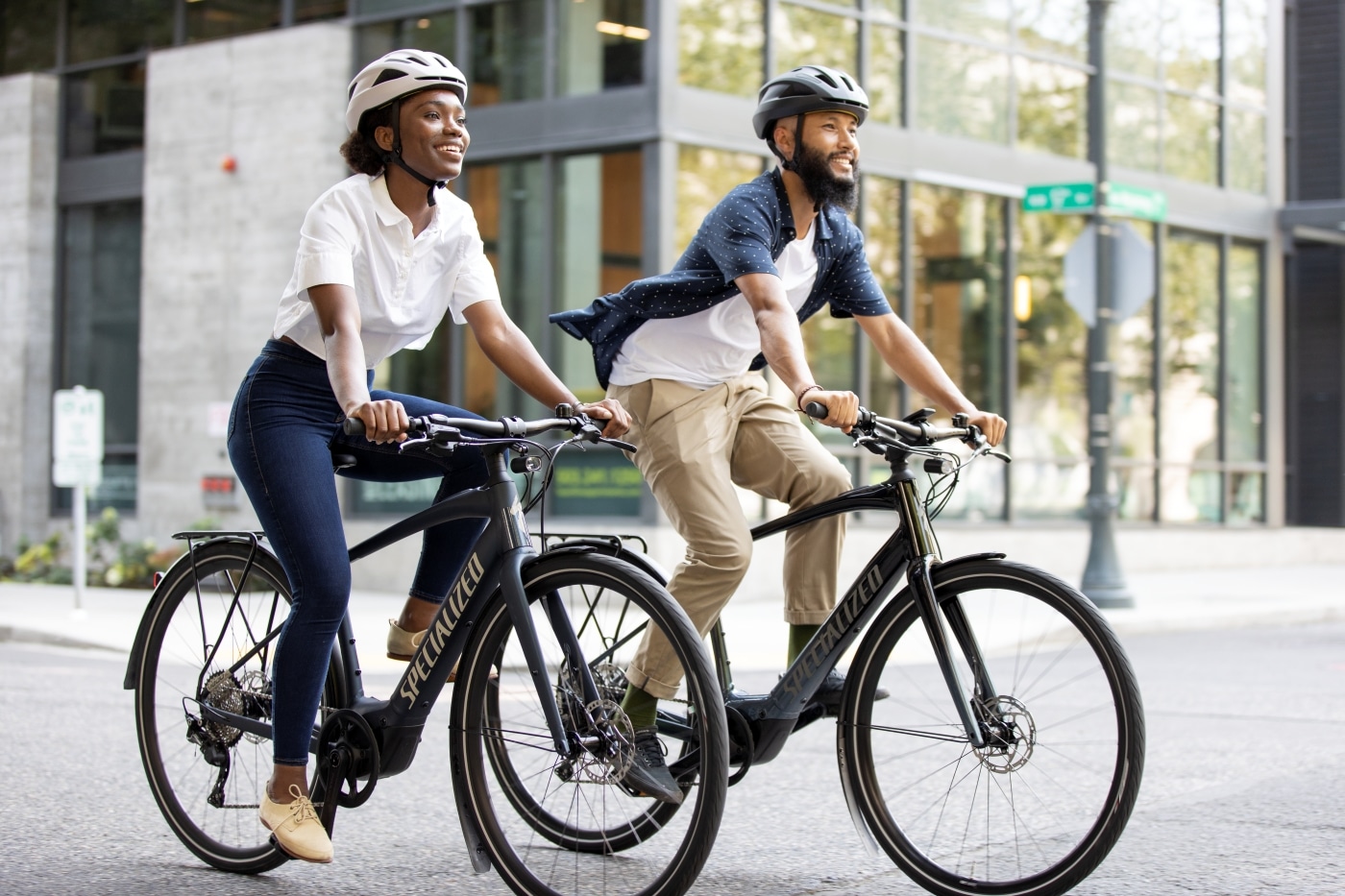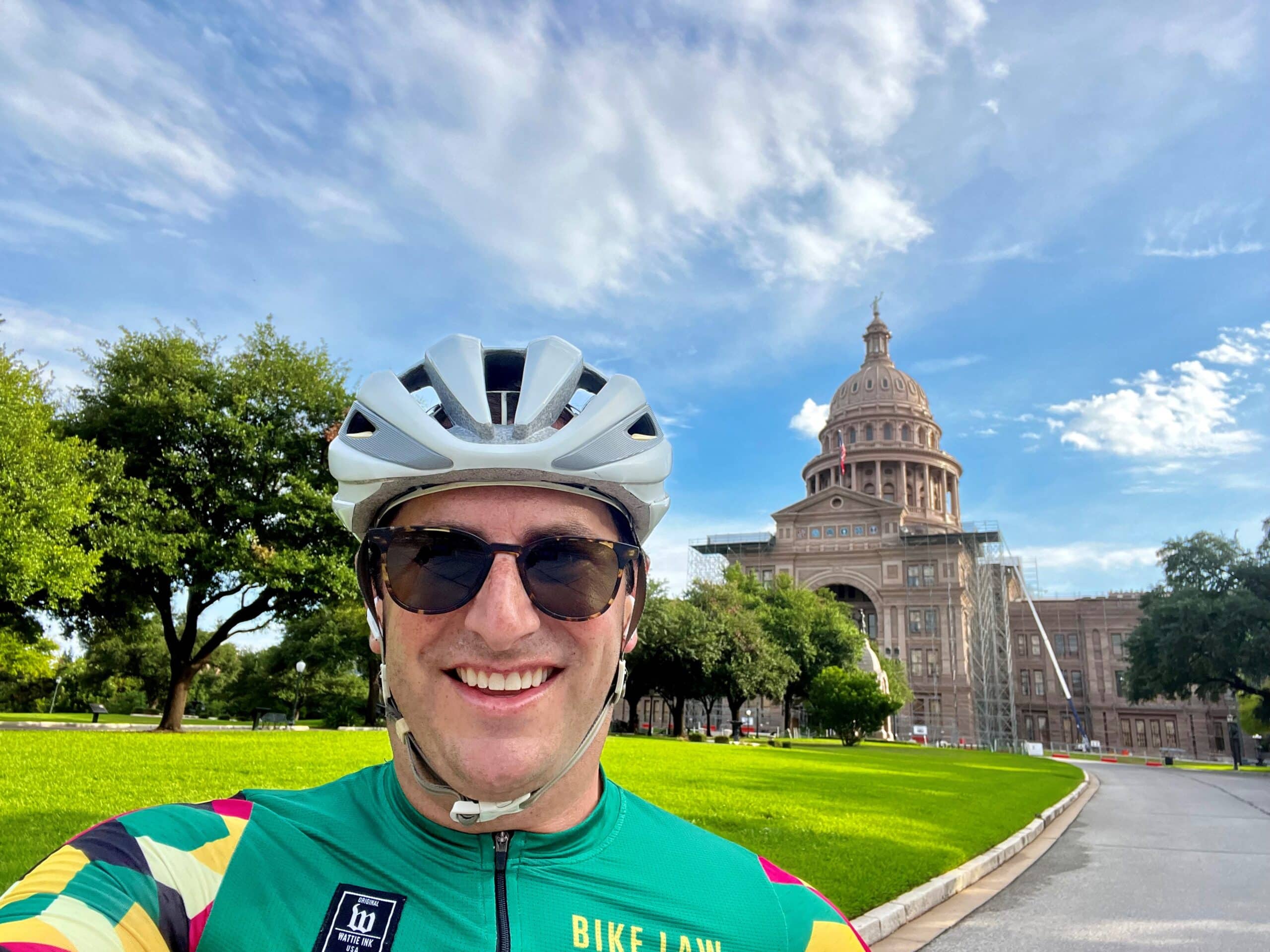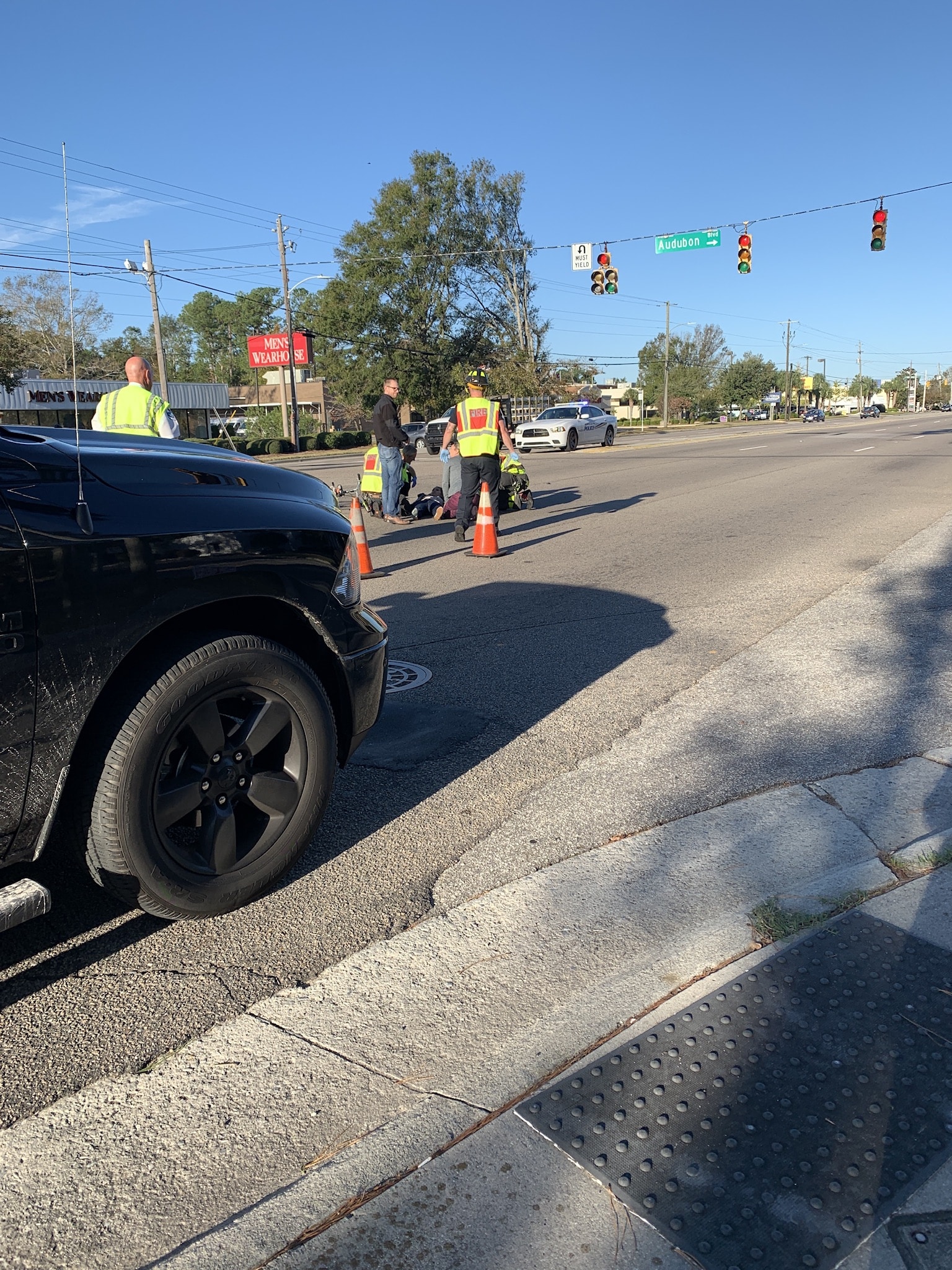A collaborative group in Maine is tackling punishment passes, three-foot violations and other unsafe driving practices from within Maine's Law Enforcement departments.
In Maine, a group of law enforcement officers, legal professionals, bicycle racers, bicycle commuters, planners and educators led by the Bicycle Coalition of Maine (“BCM”) are working together to address unsafe driving behaviors that place bicycle riders, walkers and other vulnerable users at risk of serious harm or death.
We call ourselves the Law Enforcement Collaborative (the LEC) and meet in person approximately every six weeks for an hour and a half to discuss, develop and implement strategies for keeping all users of our State’s public ways safe. We take on issues like punishment passes, three-foot violations, right hooks, bicyclist harassment and driver frustrations. We debate the law and how complaints should be handled. We watch footage from bicycle cameras, bring in traffic engineers to educate us on infrastructure challenges, plan educational seminars, draft materials for use in driver education programs, discuss proposed legislation, talk about difficulties associated with crash reporting and more.
Although still relatively green, the LEC has already been able to accomplish a considerable amount by working together with law enforcement officers. Here are two examples of the projects we have successfully carried out:
Bicycle Law Enforcement Reference Guide for Officers
Through the LEC we heard and vetted common complaints that law enforcement officers aren’t citing drivers or bicyclists enough for a dangerous operation. During our discussions, we learned that some officers may not be issuing citations and summonses because of lack of familiarity with bicycle law or lack of easy access to bicycle statutes.
In response, we designed the above a two-sided Bicycle Law Enforcement Guide that officers can quickly turn to for information about bicycle laws and corresponding fines for violation of the same. One side of the guide has motorist violations and lists laws like those that address turning near bicyclists and unsafe passing. The other side of the guide has bicyclist violations and lists laws like those that address wrong way riding and lighting. Because the guide was created and endorsed by law enforcement officers, we are finding that it is regularly being used by local and state law enforcement agencies. For example, the Yarmouth Police Department posts the guide on its Facebook page here. In addition, having the appropriate statutes readily available to the officers makes it more likely that they will cite the correct statutes on legal paperwork and less likely that cases will be dismissed by the court on procedural grounds, which officers explained to us has been a problem in the past.
Vulnerable User Safety Details
In 2016, several of the law enforcement officers within the LEC began working with their home agencies and the BCM to carry out vulnerable user safety details specifically designed to target dangerous driving around bicyclists and pedestrians, as well as unsafe bicycling and pedestrian choices. The vulnerable user safety details work like other safety details you may have seen. Just like details that target drunk driving or failure to use seatbelts, vulnerable user safety details target people who are making public roadways particularly unsafe for people walking and biking. During these details, citations and warnings were issued and the public began to talk. Word got out early in the high bicycling season (which is June in Maine) that drivers were being ticketed for practices like not giving bicyclists at least three feet of space when passing or failing to yield to pedestrians in a crosswalk. Likewise, Maine Public Radio’s story Life or Death on the Road, which covered the 2016 safety detail, got the public thinking about their operational choices around bicyclists and the potentially deadly consequences of the same. Further, officers who participated in the detail became better versed in the laws that they need to understand to protect vulnerable users in the scope and course of their everyday work. In 2017, the initiative grew and over ten law enforcement departments from across the state joined in on the effort. This article explains the expanded efforts in greater detail and highlights Lt. Frank Clark, a member of the LEC, a bicyclist, and the driving force behind the growth in the number of statewide details. In the next several years, the LEC hopes to see all counties in Maine participating in the safety details and would like to see the details taking place regularly throughout the year.
Other new and ongoing initiatives of the Maine LEC
Additional projects that the LEC is taking on include:
- A collaboration with District Attorney Andrew Robinson of the Androscoggin District Attorney’s Office to train all Maine Prosecutors on bicycle law at the 2017 Prosecutors Annual Conference;
- A review and redrafting of the bicyclist and pedestrian portions of the driver’s education materials used by the Maine Bureau of Highway Safety in their defensive driving course;
- The “More Officers Riding and Racing Bikes” initiative led by Bill Black of PVC and Stephanie Makoujy of Tall Sock Racing, who hope to increase safety on the roadway by increasing the number of law enforcement officers riding bicycling;
- the development of a best practice guide for reporting close calls, unsafe passes and other dangerous behaviors to law enforcement agencies, coupled with a template warning letter to be distributed to law enforcement officers across the state; and
- the creation of bicycle crash response checklists for officers and prosecutors.
More information about the collaborative the Maine LEC can be found on BCM’s website or by contacting me or Jim Tasse, the co-chairs of the Collaborative.
Featured photo credit: Press Herald
If you are in need of representation in Maine contact one of our Bike Accident Lawyers in your area.

Lauri Boxer-Macomber has been an avid rider for decades. Lauri’s Maine law practice is focused on advocating for the rights of bicyclists, pedestrians, and other vulnerable road users.
Lauri’s riding experience and legal training are complemented by her advocacy work. She is an active Board Member of the Bicycle Coalition of Maine, a Governor of the Maine Trial Lawyers Association, and a Member of the American League of Bicyclists. She also chairs the Bicycle Coalition of Maine’s Policy and Legislation Committee and is one of the founding members and facilitators of the Bicycle Coalition of Maine’s Law Enforcement Collaborative, a group of law enforcement officers, planners, bicycle advocates, and others who meet regularly with the goal of improving safety on Maine’s roadways.



